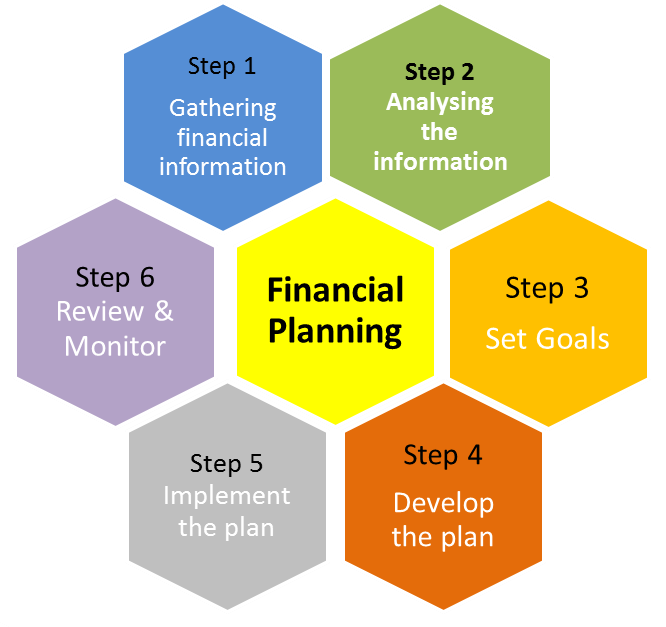Financial planning is the ultimate tool for wealth creation. In any sphere of life, prior planning helps to get maximum results. Our personal finance is no different from it. Therefore financial planning is very important for wealth creation.

Before we discuss financial planning, let me describe the 5 (five) financial cycles in human life.
a) The Alpha stage
In this stage an individual starts earning an entry-level income. He or she is young and has just started earning a regular income. The expenses in this stage tend to be just about as high as income, leaving small surplus funds to save.
b) The Bravo stage
In this stage he or she is young & married but no children. Often both the individual is earning. The income is relatively high and expenses are moderate since they are now presumably sharing living expenses such as house, transport, food etc. The ability of the Bravo couple to save is quite high, though the propensity or desire to save is still low. It happens due to new found freedom & money, less liability as well as responsibility.
c) The Charlie stage
This stage starts with the arrival of first child of the couple. The cost of living shoots up. This may be in terms of cost of medical support, decrease in income as a result of parent being at home, an increase in expenses for child care or both. The ability to save decreases drastically due to increasing expenses or lowering of income or both. However the propensity to save is very high as they have a motivation to do so.
d) The Delta stage
Here both the parents are typically working since last child is of school going age. Income is higher, nearly as high in real term as it will ever go. Expenses for the Deltas may be divided into two sections, the early Delta stage and the later Delta stage. The early Delta stage is before the oldest child is in college while the later Delta stage includes college education for the children. Expenses in the early Delta stage are moderate to high, increasing as children become older and costlier. In this stage propensity to save is somewhat higher as retirement looms, but ability to save diminishes as expenses mount during the children’s college year.
e) The Echo stage
when the last child has left home or when the couple and single individual without children approach the last decade of their working life. This is also known as empty nest stage. Income at this stage is still very high, but expenses drop substantially.
As you could see from above, Bravo stage is the most crucial because at this stage we have ability to save but low propensity. But the young couples get tempted towards lifestyle than future planning. The consumer product manufacturers target this class through advertisement, offers and appeasement. If one is not conscious and concern about savings/investing for future, there is substantial scope to drift away and create financial complexities for future. Though the realisation comes at Charlie stage, the ability to save goes down. It also become difficult to compromise on lifestyle built up is Bravo stage. It is therefore very important to follow the motto of “Delayed gratification” in Bravo stage.
One should consciously start financial planning as soon as he or she enters the Bravo stage with the help of a professional financial planner. An early stage financial planning gives substantial edge and helps to fulfill many of the dreams like well-furnished home, vacation, luxury car etc. Also it eases out the effort for building up corpus for children education, retirement etc.
One can prepare his or her own financial plan and create wealth by following the steps given below.
Step 1: Gather your financial information.
In this first step of financial planning, we need to gather all the financial information like income, savings, living expenses, assets and debts etc. Put all the data in a tabular format.
Step 2: Analysing the information.
Once the information are gathered, analyze them to assess the current financial position. It gives an idea about the liabilities to be repaid, assets in hand, networth and surplus money for investment.
Step 3: Defining the financial goals.
In financial planning the investment should be goal oriented. Goals could be building corpus for home buying, children’s higher education, marriage, travel, retirement etc. Before we start financial planning the goal or purpose should be clear to us.
Step 4: Developing a financial plan.
Once we know our current financial position and future financial goals, we can now prepare the financial plan. Prior to this we may require to prepare monthly budget to generate surplus money for investment. We may also require to realign assets and liabilities favouring the desired financial goals. I have a course on Financial Planning for beginners which you may access for in-depth learning of financial planning.
Step 5: Implementation of the financial plan
The financial plan starts giving results only when it is implemented. The goals can be short, medium or long term. Accordingly, you have to invest money through financial product like, equity, mutual fund, PPF etc. It has to be regular and very disciplined. In other words, the financial plan implementation will be an ongoing exercise.
Step 6: Periodic review of the plan
Since financial planning is an ongoing process it does not end in mere investment. You need to regularly assess your financial decisions. Changing personal, social, and economic factors may require more frequent assessments. When life events affect your financial needs, this financial planning process will provide a vehicle for adapting to those changes. Regularly reviewing this decision-making process will help you make priority adjustments that will bring your financial goals and activities in line with your current life situation.
The financial planning works as guiding map to navigate through financial life and it certainly helps in wealth creation. If you think you need to increase your income for better investment than you may read 5 solid ways to earn an extra income.

